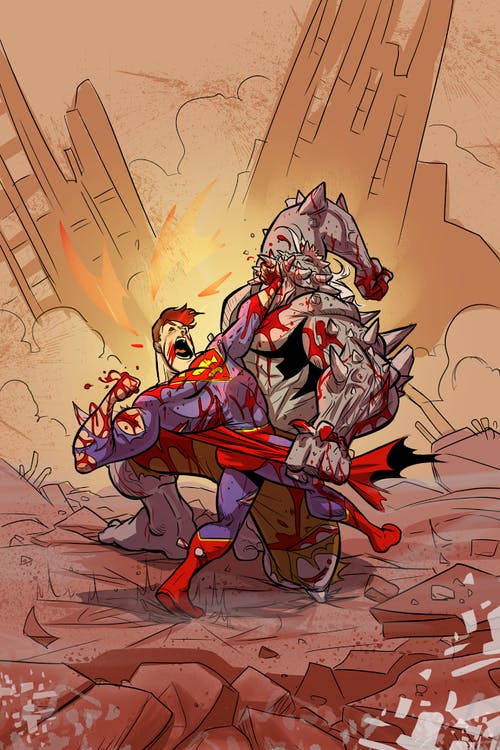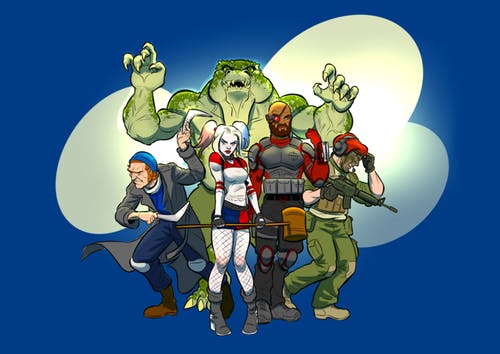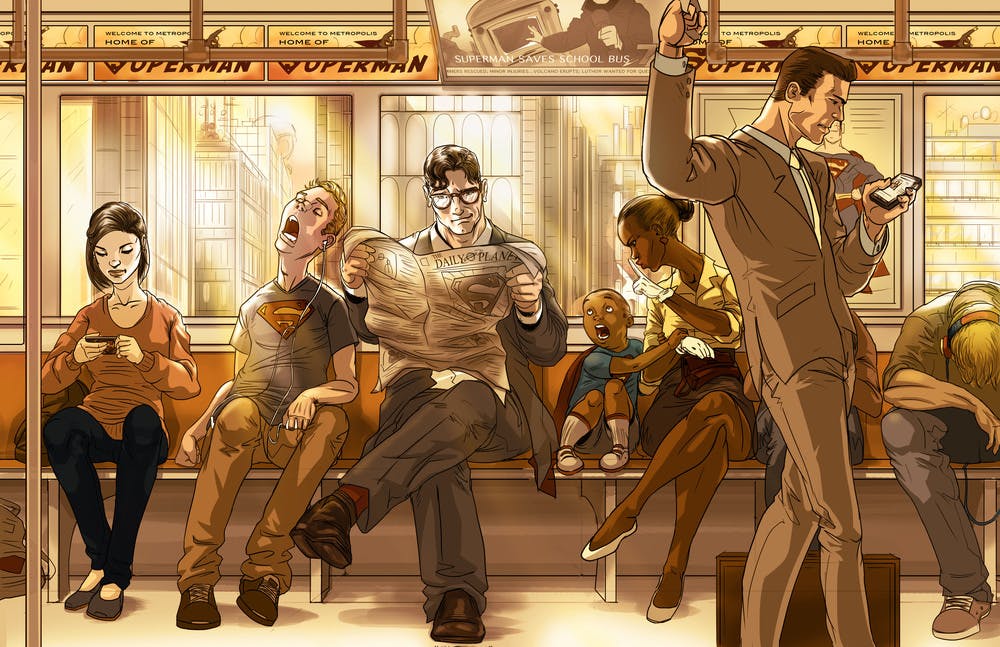Nietzsche's Superman As Informed By The DCEU & Zack Snyder
How Zack Snyder doesn’t get Superheroes, but still explains Nietzsche.

"Faster than a speeding bullet! More powerful than a locomotive! Able to leap tall buildings at a single bound!" The Superman radio show began with feats of strength and a demonstration of power unavailable to the average man. This narration captured the imaginations of those following the man of tomorrow.
Probably wasn't quite the idea German philosopher, Friedrich Nietzsche, had in mind with his concept of the übermensch or Superman. The übermensch (introduced in Thus Spoke Zarathustra) represents the next phase of human thought and evolution, one superior to the pettiness of the current human condition and the moral framework (built around Christianity) that was tasked to police that condition. Nietzsche's Superman (like DC's) examined the power, values, and morality of a being with extraordinary power. Even at its inception, the superhero genre was grappling with the consequences of power.
READ: A Clark Kent Comic: A Teenage Superman Story
I heard it stated (quite brilliantly) that director Zack Snyder was always interested in the "super" part of the equation, with little regard for the "hero" part of it. His trilogy of critically maligned, cynical, blockbusters (Man of Steel, Batman V. Superman: Dawn of Justice, and Justice League) sweats with an aggressive ugliness. The rest of the franchise (Suicide Squad, Wonder Woman, and Aquaman) is burdened by his dour tone and amorality which they actively combat. Despite its many glaring faults, Zack Snyder's lugubrious, aggressively nihilistic DCEU may best explain Nietzsche's ideas.
Spoilers For Man of Steel, Batman V Superman, and Suicide Squad Ahead
Man of Steel: Zod Is Dead
"God Is Dead." Most people unfamiliar with Nietzsche are familiar with this quote (and maybe the concept of nihilism). This wasn't a triumphant proclamation of atheism, Nietzsche was proclaiming the death of a Christian-based/traditional morality rather than an actual “god.” To Nietzsche, Christian morality was more obsolete than nefarious; more supernatural than natural. He disapproved of the concept of a spirit or an afterlife and the virtues of piety and humility. He saw these values as divergent from the natural evolution of selfishness, ambition, and sex (the übermensch would pursue these with a good conscience - which differentiates this from Ayn Rand's objectivism). The elevation of meek accommodation and subservience with an eye towards a spiritual afterlife were the Christian qualities Nietzsche considered a distraction. In the Zarathustra prologue, the eponymous character wanted to evolve beyond Christian ethics to a place where human beings were free to create their own values.
In 2013, Warner Bros. and Christopher Nolan selected Zack Snyder to be the director of Man of Steel. Snyder and writer David S. Goyer (Blade: Trinity) set out to replicate the "realism" template used for Nolan's successful Batman Begins. However, Snyder's "realism" is a “rated-M” realism: a prepubescent awareness of one's own power - a fetishization of gore and violence as real. To the surprise of many, Snyder's first Man of Steel trailer was restrained and naturalistic. However, it soon became clear that his "dark and gritty" aesthetic referred not to his style, but to the morality and cynicism of his characters.

It was clear from the start that Zack Snyder was the wrong choice to direct a Superman film. He looked upon “corny” virtues like truth, justice, and the American Way with disdain. What Snyder doesn’t understand - and the reason why this DC Extended Universe will never succeed - is that Superman is not an anti-hero. Snyder's Batman was singled out for praise in Batman V Superman because Snyder "gets" vigilantism and understands the appeal of an adolescent “awesomeness of violence.” Superman is the proto-hero, a paragon and embodiment of heroism. Snyder tellingly wants Superman to “grow-up”, hinting that he wants to usher in the testosterone of puberty. He doesn’t understand that “realism” is not simply hyper-violence and cynicism, it's about hope and joy and heroism.
Here we have a Superman created by Jerry Siegel and Joel Shuster that was meant to be an inspiration for readers - an ideal. The "superman" was already created as a model, yet Snyder viewed Superman's compassion as a weakness. Furthermore, Snyder is so intent on unleashing Superman's physical might, that he doesn't understand that the character's greatest power (and weakness) is in restraint. What one does with so much power has always been the challenge of Superman.
The heroic nature of Superman is in the aspirational: lending a hand to those less fortunate, finding the moral strength to turn the other cheek, wielding great power for good. None of these qualities are evident in the Superman of Zack Snyder's DC franchise; the director sees these principles as antiquated and "un-cool." The biggest betrayal and fundamental misreading of superheroes was Superman's murder of Zod. Snyder’s Übermensch is freed from the chains of tradition and comic canon. He is liberated to pave his own “dark and gritty” vision of the DC Extended Universe.
“Zod is Dead. Superman is dead and we have killed him. How shall we comfort ourselves, the murderers of all murderers?”
Batman v. Superman: Master v. Slave Morality
“There’s more to come and I think it’s consistent in its …awesomeness.”
— Zack Snyder (Hero Complex; March 16, 2011)
So what are the values that Snyder would have us graft on to Übermensch after the death of Superman?
Nietzsches’ criticism of Christian morality extends from a theme he calls the "Master-Slave morality." The philosopher saw the virtues of kindness, empathy, humility as a response and self-justification to the moral high ground while being a subjugated people; to him, these traits were born out of slavery. By appropriating their "defects" and making them into virtues - the early Christians rebelled psychologically: weakness became kindness, submission became obedience, inability to take vengeance became forgiveness. The "Slave morality" was created to empower those who had none, to make their values the relevant values. While the term “slave” is very strong, Nietzsche has a distinct respect for what Christianity was able to achieve. His "death of god" was a diagnosis, not a condemnation. Opposed to the Christian "Slave Morality," the "Master Morality" was the values of the nobles - power, strength, honor, the ability to exert one’s will. In a somewhat strange and apropos turn, Nietzsche traced his master morality theory back to the ancient Romans and Greeks - the same civilization (with 300) to which Zack Snyder can trace his early success.
In Batman v. Superman, Zack Snyder was setting up a competition of moralities: The anti-hero Batman (master morality), who values strength, power, and revenge versus the the hero Superman (slave morality) who values compassion, empathy and humility (even though these qualities aren't necessarily found in the recent films, it's still what the "S" represents). What Zack Snyder admires is physical, brute force and the free exercise of will. It’s no question which side of this paradigm he resides. (Like most man-babies, Snyder seems like a libertarian; his next project is rumored to be an adaptation Ayn Rand's Objectivist novel 'The Fountainhead). If Snyder has a Nietzschean disdain for restraint and discipline, how is he to admire a hero with limitless power, but whose power comes from restraint?
Nietzsche's ambiguity leads to many misconceptions. Nihilism is not a philosophy he admires, but a position that he is warning against. "God Is Dead" is not an atheist rallying cry, but a challenge to build your own morality. Nietzsche's German origins and striving towards a superiority appealed to the Nazi's master race paradigm. Snyder takes all of Nietzsche's thoughts experiments, takes them at their most literal and drives to them to the worst conclusion that someone with immense strength is about exercising your will over others. In this way, Snyder destroys Superman's values in Man of Steel before offing him in Batman V. Superman. There is a strange contempt he has for this hero who doesn't bend others to his will.
Suicide Squad: Beyond Good and Evil
Nietzsche is often labeled a proponent of nihilism - he’s not. He merely identified that this was the state of the world in a vacuum of morality. Nothing confirms Nietzsche’s theory better than Suicide Squad. In a universe where Superman doesn’t stand for anything, Suicide Squad was inevitable - just as nihilism is inevitable in a world without values. By recasting the villains as “heroes” in the DC Extended Universe, Suicide Squad makes for one of the most meaningless super”hero” films created. After destroying the ideals of Superman - what is a hero? Who do we follow? A Captain Boomerang? A Killer Croc? What are the values of a Killer Croc?

"Aimless" best describes a Superhero film with no heroes. We are asked to root for Deadshot because he is Will Smith, Harley Quinn because she's a cult favorite, and Rick Flagg because he is the conventional "good guy" with a motivation. But no one is ever quite bad enough (for that would violate the blockbuster maxim of a "likable protagonist) and no one is ever quite good enough (cause the foundation built by Zack Snyder is not reflective of this). We have to root for them because they are "cool" - and if we don't buy that they're "cool" then Suicide Squad doesn't work. The movie is more concerned with getting you to buy into the "cool" than by answering basic cinema plot questions. What is the mission? Why this group? Why not conventional superheroes or military? What skills does each member bring to the table?
Sadly, Suicide Squad never asks the complex questions relevant to a story of this genre. This concept could work as Lee Marvin and The Dirty Dozen can attest. But the film is so imprinted by Snyder, that the concern for "awesomeness" and the reliance on formula (yes that is yet another blue, beam of light in the sky surrounded by swirling debris) trumps any meditation on the nature of being a hero or a villain, what moral boundaries these self-proclaimed "bad-guys" are willing to cross, or whether the ends justify the means. Suicide Squad could have been a version of The Expendables crossed with The Hateful Eight. Instead, without anchoring anyone with ethics and opposition to those ethics, Suicide Squad falls back on a familiar superhero "beats" without the heart, explanation, or story.
After pronouncing god dead in Nietzsche’s The Parable of a Madman, the titular madman throws down his lantern as he is engulfed in existential ennui. "I have come too early," he said then; "my time is not yet” (this is remarkably similar to a “dream sequence” in Batman V Superman, where the Flash (not a Lantern) ham-fistedly foreshadows more DC movies by questioning whether he's "too soon"). Nietzsche understood that his ideas were ahead of the time. How much longer will it take for the audience to see that these logos are merely used as bait?
There’s too much pride and money on the line for Zack Snyder to ever relinquish his foolish destruction of this franchise and complete misunderstanding of these characters. I don’t expect him to have the self-awareness to realize what damage he’s done to these beloved brands. Most frightening is how imprinted Zack Snyder's "American Way" will be on a generation who sees his ideology as the representation of these characters. It's certainly not the idealistic American Way of "Give me your tired, your poor, your huddled masses yearning to breathe free." Snyder's perversion of the American Way reflects the bizarro, fear-based Bush/Cheney-era. Immigrants (even from Krypton) are dangerous and to be feared. Preemptive strikes and extrajudicial punishment is warranted and encouraged. Bruce Wayne echoes former Vice-President Dick Cheney (and supervillain in his own right) almost beat for beat in his justification: “If we believe that there is even a 1% chance that he is our enemy we have to take it as an absolute certainty.” It's a franchise too big to fail. Truth, justice, and the American Way are excised in favor of “shock and awe” aesthetics and “cool uber alles.”
But if you think - as I do - that superheroes are ultimately about hope, maybe we'll see the gross nihilism of Zack Snyder's Übermensch for what it is - a footnote and an aberration. Another version of these characters will come to the screen as superheroes seem to be in a state of eternal recurrence, providing another director the opportunity to reframe DC's hallowed heroes. You'll remember the values that Superman embodies at his most hopeful:
The American tale of a refugee from a distant land that comes to this country and become its most recognizable representative. A hero who uses the great power provided by his adopted home to help the weakest of society and stand up for the welfare of those who are different. A character who only goes to force as a last resort, because he's not afraid to turn the other cheek. Someone who struggles with being "different" and fitting in, someone who suffers unrequited love, wonders about his past, and aspires to his future. These are the values we recognize in each other, the common man, and the Superman.
